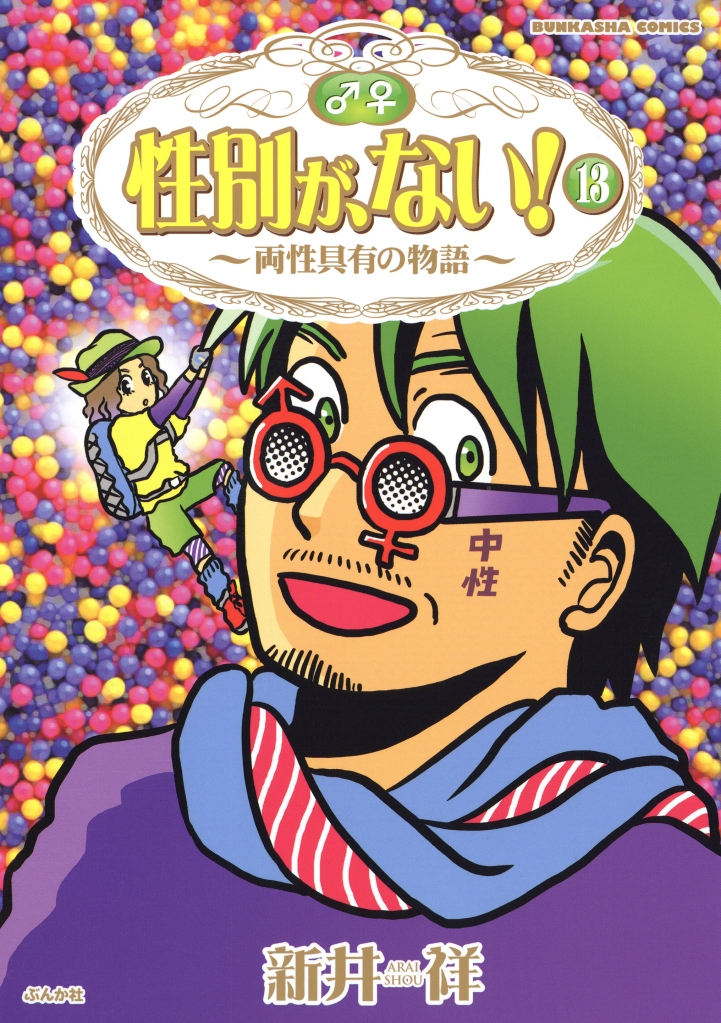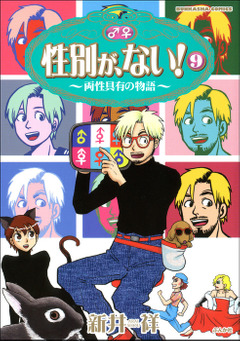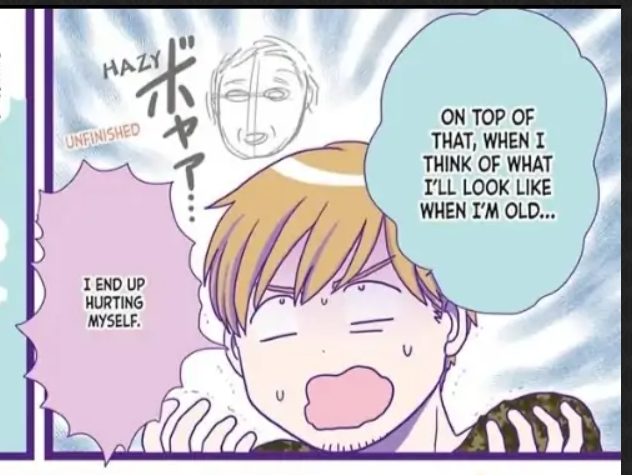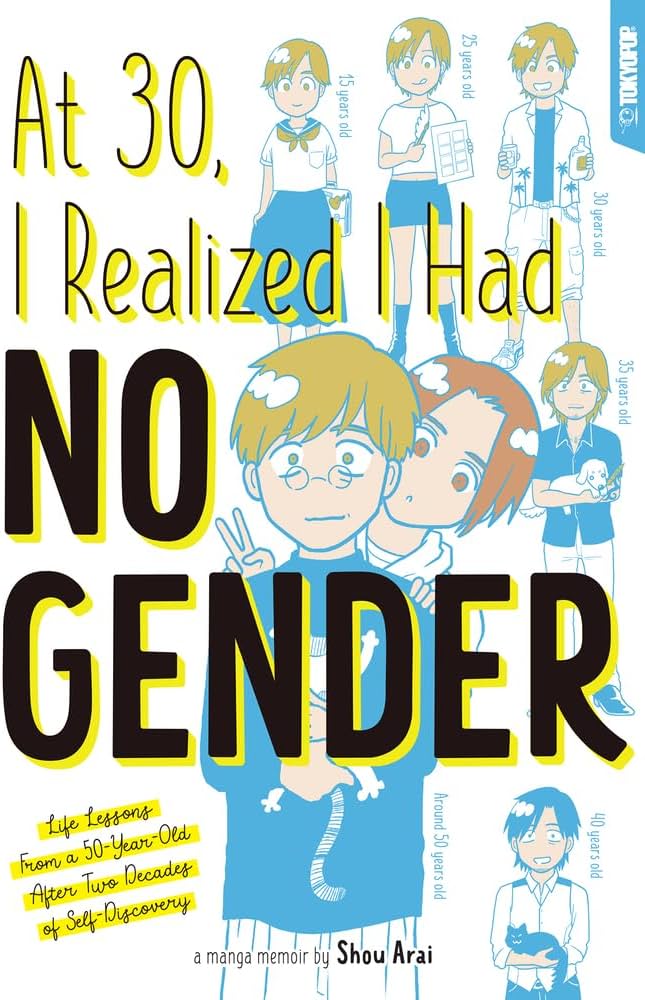Here on this site, I have complained MANY TIMES that I sometimes have to wonder if librarians read the manga before they decide where to shelve it. But, this is the first time I’ve had to ask myself… did the Official English language publisher read this book?
Like, at all?
SPOILERS
.
.
.
They did potential fans of Arai-sensei a great disservice, in my opinion. Because, you might think, from the title, that what this story will be about is Arai-sensei’s self-discovery. What happened at 30 that caused Arai-sensei to declare they have no gender? What does it mean to Arai-sensei to be genderless? Are they coming out as non-binary or… something else?
Whelp, spoiler, literally NONE of that is in this book.
Zero.
Nada.
Zip.
This entire manga reads like if the intimate details of Arai-sensei’s life are well known to the reader.
They are, of course…
…IN JAPAN.
Arai Shou has written a ton of books about their personal gender discovery in Japanese. In fact, I might suspect, given the title, Seibetsu ga, Nai! ~ Ryouseiguyuu no Monogatari / No Gender! A Story of Androgyny of which there are 18 volumes might be the main place to read about Arai-sensei’s personal journey. Some of which, I presume includes how, after marrying a man, their body begins changing and they discover they are intersex, specifically that they have Turners Syndrome.

Moreover, reading this series, I suspect a reader might learn that despite having top surgery and taking male hormones, Arai-sensei has come to the conclusion (currently) that they are also non-binary.
What is distressing about the English-language translation of At 30, I Realized I Had No Gender: Life Lessons From a 50-Year-Old After Two Decades of Self-Discovery is that the publisher uses the “he” pronoun to describe Arai-sensei throughout the book, saying that that’s Arai-sensei’s preference–even though, throughout the book, the narrator looks out of the panels at the reader and tells us that they feel neither male nor female and that they struggle with this, as they present as masculine. I was like, okay, it seems rare that someone who uses he/him would still consider himself non-binary, but who am I to say? I can roll. Yet, the more I read the way Arai talked about themselves confused me to the point that I actually briefly thought that either the term intersex was being used interchangeably for non-binary in Japan… or I was loosing my mind and I no longer understood what intersex or non-binary ACTUALLY meant.
It was only after watching an entire documentary about Arai-sensei did this book–the only autobiographical manga of Arai-sensei’s to be either scanlated OR to get an official publication in English–even BEGIN to make sense.
So, why this book? Why is this the first we’ve met Arai-sensei??
What was TokyoPop thinking? Why not start with Seibetsu ga, Nai! / No Gender! ??? These kinds of gender and sexual autobiographical books are extremely popular right now–witness all of the reviews I’ve been doing lately along these lines. I’m not sure there isn’t a market for an 18 volume series about an intersex person discovering 1) that they are genetically intersex, 2) that they want to express more masculinity, but not ALL of it and, instead, intentionally live in-between as a non-binary person, and 3) hooking up with their cis male gay/pansexual assistant and trying to decide if that made them a gay man or what? And eventually deciding that it didn’t matter and that, in the famous words of Chuck Tingle, love is love.
That’s fascinating stuff! I’d read the f*ck out of that. And these covers are darling!

I can only imagine that what happened in the TokyoPop boardroom is that they started looking around at the books their rivals were buying (see: any of the zillion gender/sexual minority 101 autobiographies that seem to be sweeping the 2023-4 manga market) and just GRABBED one of Arai-sensei’s at f*cking random.
I kind of wish that I hadn’t returned my copy to the library already because now that I watched a full two hours of an explanation of Arai-sensei’s life, I’d like to see where they are now. I presume that’s the appeal to Japanese audiences of At 30, I Realized I Had No Gender: Life Lessons From a 50-Year-Old After Two Decades of Self-Discovery.
Sadly, it makes almost NO SENSE whatsoever to English-speaking audiences who have not had the pleasure to meet this mangaka and their darling partner Khou… not even through pirate sites! One of the few pieces of Arai-sensei’s work that you can read is their contribution to the anthology manga, Change H. The other thing by Arai-sensei that I’ve found that’s been scanlated is Yuzu no Koto. I have not yet read either, but I honestly may recommend reading these because at least they stand alone.
If you decide want to tackle At 30…, I recommend that you watch the documentary (in Japanese, with subtitles) that I linked to above. The documentary is fascinating. Arai-sensei is frank and forthcoming about their experiences and, unlike TokyoPop, uses “S” to signify Arai-sensei’s pronoun since, if you listen to the Japanese, it’s clear that they use NO pronouns at all (which is, of course, much more possible in Japanese than it is in English.)
So a mixed bag? Not sure I’d recommend the actual manga because it’s mostly about Arai-sensei freaking out about growing old while Khou still looks very young, random bits about their already established relationship with no other context (NO CONTEXT FOR YOU!!), and make-up and clothing tips for readers who have written in desiring to pass as one gender or another or as genderfluid.
It’s not a great introduction to the idea of being born intersex, the documentary does a much better job a that.
Because if this is your only introduction to Arai-sensei, they don’t come off great?

Like, this “hurt myself” line is a bit disturbing if you have no context.
Which you don’t.


highly questionable localization aside, I actually had no idea this person existed so thank you for introducing me, I will be bookmarking this post for further reading material o7